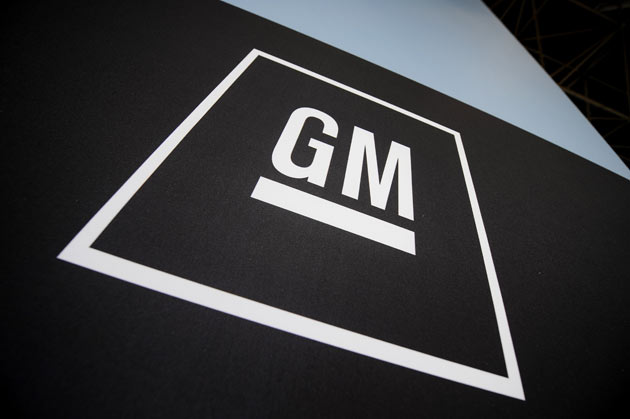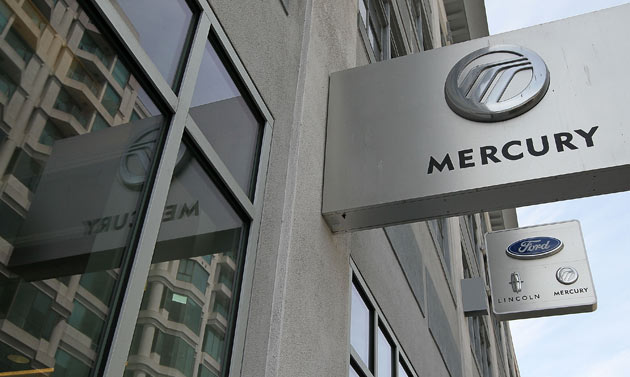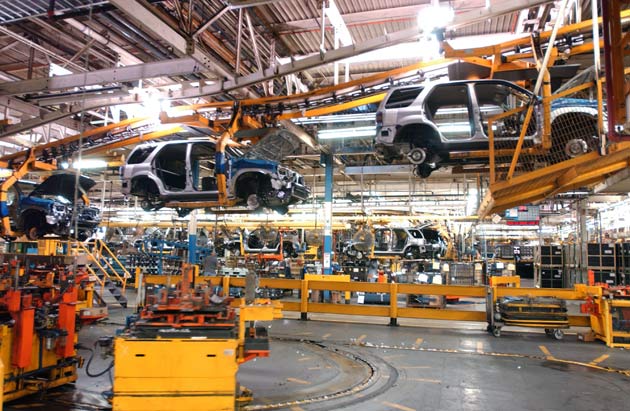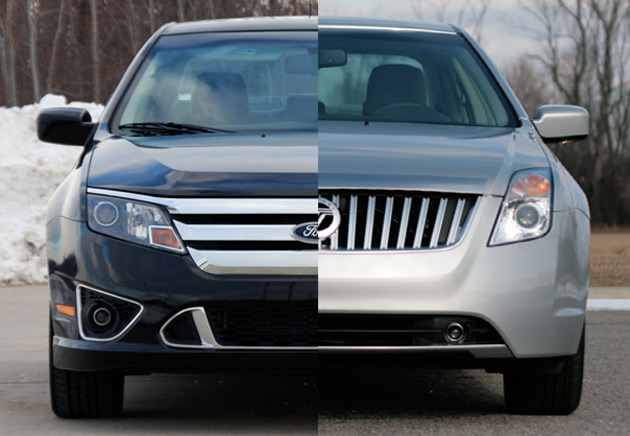It's a question few are asking the day after Ford announced that Mercury – named after the "messenger of the gods" in Roman mythology – would wind down production after 70 years of business. Why? Mercury lost its way so long ago that being shuttered at some point was a foregone conclusion. The only question was when. And now we have the answer.
But that doesn't answer why Ford chose June 2, 2010 as the day to announce the death of Mercury. What's so special about this year and this time in the auto industry that made Ford pull the trigger? Follow the jump to find out.
GM Primes the Pump

First off, Mercury's demise is no surprise given the spate of brand executions over the past year. General Motors killed Saturn, Pontiac and Hummer, and at the final hour found a buyer for Saab, which was also on the chopping block. GM's decision to thin its burgeoning herd of brands was a matter of survival, and so far appears to have been the right choice. The automaker's remaining four brands (Chevrolet, Cadillac, Buick and GMC) sold more units last month than the eight-brand strong automaker did during the same month last year.
Ford, however, made it through last year's turbulence without government assistance, all while keeping Mercury in tow. In fact, seeing GM go through the process of gutting its brand portfolio must have been a major motivator in Ford's decision to shut down Mercury. The skids were greased, so to speak, and the buying public doesn't appear to mind the killing of historic U.S. auto brands, even ones like Pontiac that have enjoyed large enthusiast followings.
[Image: Stan Honda/AFP/Getty]
Doing Right by Dealers

Killing a brand isn't motivated by slow sales alone. Keeping a marque like Mercury limping along was likely less expensive all these years than having to deal with 1,172 combined Lincoln-Mercury dealerships and the extra production capacity that's freed up from not having to build any more Milans and Mariners. Only now has Ford finally decided that the cost of keeping Mercury around is more than what it takes to swing the axe.
In the case of dealerships, an automaker has two choices when it offs a brand: Pay the dealer to end its franchise agreement and stop selling the dead brand's vehicles or give it something else to sell. Ford is doing a bit both. Each one of those 1,172 combined Lincoln-Mercury dealerships will receive a financial package from Ford that includes payment for retiring the Mercury brand. Since those dealerships would be hard pressed to make a living selling only Lincoln models at the moment, Ford also announced that it will launch seven all-new or heavily revised Lincolns in the next four years, as well as further set Lincoln apart from Ford with exclusive powertrains.
It doesn't appear that Ford has asked any Lincoln-Mercury dealership to close their doors, though we imagine some percentage of the dealer body will use Mercury's death as a good enough reason to retire themselves. Those that remain, however, will have a full line-up of Lincoln vehicles to sell in the near future, and some may be absorbed by Ford dealerships to make combined Ford-Lincoln dealerships.
[Image: Justin Sullivan/Getty]
Extra Production Capacity at the Right Time

As for the question of extra production capacity, it appears that Ford picked the perfect time to stop building its middle marque. Let's take a look at each Mercury model and what will happen when their assembly lines suddenly stop.
Grand Marquis
The Ford Crown Victoria will end production soon, taking the Mercury Grand Marquis with it as well as 1,400 jobs from the St. Thomas Assembly Plant in Ontario, Canada. That's sad news for folks in Ontario, but Ford will be just fine. While the Crown Victoria and Grand Marquis enjoyed healthy fleet sales as taxis and police cruisers, those spots will eventually be filled in Ford's lineup by the Transit Connect Taxi and new Taurus-based Police Interceptor.
Mountaineer
The current body-on-frame Ford Explorer is about to be replaced by a new uni-body version built in Chicago. That means the Explorer and its Mercury Mountaineer clone will be kicked out of Ford's assembly plant in Louisville, KY to make room for small car production beginning in 2011.
Milan and Mariner
The Mercury Milan and Ford Fusion (and Lincoln MKZ) are built at Ford's Hermosillo Stamping and Assembly plant in Mexico, while the Mercury Mariner and Ford Escape (and Mazda Tribute) are built at Ford's Kansas City Assembly plant. The effect of ending production of Mercury models in both plants will result in more Fusions and Escapes, which the market wants. Fusion sales were up 13.1 percent last month alone and are up 39.3 percent year-to-date. The Fusion, of course, was recently redesigned, but even the aging Escape is selling like hot cakes with sales up 17.2 percent last month and 36.7% year-to-date.
And not for nothing, but if the Ford ever wants to challenge the Honda Accord or Toyota Camry for the title of second-best or best-selling car in America with the Fusion, it needs this extra production capacity to produce Blue Oval-badged sedans, not more Milans.
Rebadge is a Four-Letter Word

The final nail in Mercury's coffin is the vilification of rebadging. This is that lazy breed of platform sharing in which one brand sells the exact same version of a vehicle sold by another brand but with a different grille, head- and taillights. The differentiation between the two cars is minimal and often the price of one is inexplicably higher than the other, despite equipment levels being practically identical. This has been Mercury's business model since 2002 when its last two unique models – the front-wheel drive Cougar coupe and Villager minivan – ended production. Since then, every Mercury model has been a thinly veiled version of a Ford, usually with a lot more satin nickel trim and an unjustifiable higher price.
There are better ways to share a platform between brands. Volkswagen, in particular, is great at this, as most (first-gen) Audi TT owners have no idea their car shares a platform with the New Beetle. That's because Volkswagen takes the time, effort and money to design different sheetmetal for each vehicle that shares a platform; give each its own unique interior; and tune the suspension, steering, and powertrain for each individually. Ironically, Mercury never got the message, but Ford is trying to do platform sharing the right way now with Lincoln.
But that doesn't answer why Ford chose June 2, 2010 as the day to announce the death of Mercury. What's so special about this year and this time in the auto industry that made Ford pull the trigger? Follow the jump to find out.
GM Primes the Pump

First off, Mercury's demise is no surprise given the spate of brand executions over the past year. General Motors killed Saturn, Pontiac and Hummer, and at the final hour found a buyer for Saab, which was also on the chopping block. GM's decision to thin its burgeoning herd of brands was a matter of survival, and so far appears to have been the right choice. The automaker's remaining four brands (Chevrolet, Cadillac, Buick and GMC) sold more units last month than the eight-brand strong automaker did during the same month last year.
Ford, however, made it through last year's turbulence without government assistance, all while keeping Mercury in tow. In fact, seeing GM go through the process of gutting its brand portfolio must have been a major motivator in Ford's decision to shut down Mercury. The skids were greased, so to speak, and the buying public doesn't appear to mind the killing of historic U.S. auto brands, even ones like Pontiac that have enjoyed large enthusiast followings.
[Image: Stan Honda/AFP/Getty]
Doing Right by Dealers

Killing a brand isn't motivated by slow sales alone. Keeping a marque like Mercury limping along was likely less expensive all these years than having to deal with 1,172 combined Lincoln-Mercury dealerships and the extra production capacity that's freed up from not having to build any more Milans and Mariners. Only now has Ford finally decided that the cost of keeping Mercury around is more than what it takes to swing the axe.
In the case of dealerships, an automaker has two choices when it offs a brand: Pay the dealer to end its franchise agreement and stop selling the dead brand's vehicles or give it something else to sell. Ford is doing a bit both. Each one of those 1,172 combined Lincoln-Mercury dealerships will receive a financial package from Ford that includes payment for retiring the Mercury brand. Since those dealerships would be hard pressed to make a living selling only Lincoln models at the moment, Ford also announced that it will launch seven all-new or heavily revised Lincolns in the next four years, as well as further set Lincoln apart from Ford with exclusive powertrains.
It doesn't appear that Ford has asked any Lincoln-Mercury dealership to close their doors, though we imagine some percentage of the dealer body will use Mercury's death as a good enough reason to retire themselves. Those that remain, however, will have a full line-up of Lincoln vehicles to sell in the near future, and some may be absorbed by Ford dealerships to make combined Ford-Lincoln dealerships.
[Image: Justin Sullivan/Getty]
Extra Production Capacity at the Right Time

As for the question of extra production capacity, it appears that Ford picked the perfect time to stop building its middle marque. Let's take a look at each Mercury model and what will happen when their assembly lines suddenly stop.
Grand Marquis
The Ford Crown Victoria will end production soon, taking the Mercury Grand Marquis with it as well as 1,400 jobs from the St. Thomas Assembly Plant in Ontario, Canada. That's sad news for folks in Ontario, but Ford will be just fine. While the Crown Victoria and Grand Marquis enjoyed healthy fleet sales as taxis and police cruisers, those spots will eventually be filled in Ford's lineup by the Transit Connect Taxi and new Taurus-based Police Interceptor.
Mountaineer
The current body-on-frame Ford Explorer is about to be replaced by a new uni-body version built in Chicago. That means the Explorer and its Mercury Mountaineer clone will be kicked out of Ford's assembly plant in Louisville, KY to make room for small car production beginning in 2011.
Milan and Mariner
The Mercury Milan and Ford Fusion (and Lincoln MKZ) are built at Ford's Hermosillo Stamping and Assembly plant in Mexico, while the Mercury Mariner and Ford Escape (and Mazda Tribute) are built at Ford's Kansas City Assembly plant. The effect of ending production of Mercury models in both plants will result in more Fusions and Escapes, which the market wants. Fusion sales were up 13.1 percent last month alone and are up 39.3 percent year-to-date. The Fusion, of course, was recently redesigned, but even the aging Escape is selling like hot cakes with sales up 17.2 percent last month and 36.7% year-to-date.
And not for nothing, but if the Ford ever wants to challenge the Honda Accord or Toyota Camry for the title of second-best or best-selling car in America with the Fusion, it needs this extra production capacity to produce Blue Oval-badged sedans, not more Milans.
Rebadge is a Four-Letter Word

The final nail in Mercury's coffin is the vilification of rebadging. This is that lazy breed of platform sharing in which one brand sells the exact same version of a vehicle sold by another brand but with a different grille, head- and taillights. The differentiation between the two cars is minimal and often the price of one is inexplicably higher than the other, despite equipment levels being practically identical. This has been Mercury's business model since 2002 when its last two unique models – the front-wheel drive Cougar coupe and Villager minivan – ended production. Since then, every Mercury model has been a thinly veiled version of a Ford, usually with a lot more satin nickel trim and an unjustifiable higher price.
There are better ways to share a platform between brands. Volkswagen, in particular, is great at this, as most (first-gen) Audi TT owners have no idea their car shares a platform with the New Beetle. That's because Volkswagen takes the time, effort and money to design different sheetmetal for each vehicle that shares a platform; give each its own unique interior; and tune the suspension, steering, and powertrain for each individually. Ironically, Mercury never got the message, but Ford is trying to do platform sharing the right way now with Lincoln.


Sign in to post
Please sign in to leave a comment.
Continue